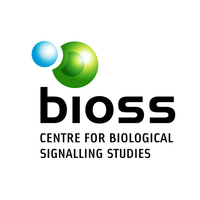BIOSS Centre for Biological Signalling Studies

Biological signalling processes regulate life in all cells of every organism. Numerous human diseases are caused by defective or deregulated cellular signalling paths. The goal of the BIOSS Centre for Biological Signalling Studies is to attain a more precise understanding of these processes.The study of the formation and processing of signals in cells is a rapidly developing field of research in biology and medicine. Its main thrust is the search for new ways of understanding the molecular foundations and principles of biological signal processing. The scientists at BIOSS have dedicated themselves to this task and are making elementary contributions to biological and medical research and practice.
International and Interdisciplinary Signalling Research
The excellence cluster has consolidated the strong signalling research already being conducted at the University of Freiburg and sent it in a new direction by establishing the first Chair for Synthetic Biology in Germany. BIOSS combines this promising new research area with the modern analytical biosciences and the profile of the Faculty of Engineering, thus creating ideal conditions in Freiburg for conducting world class signalling research.
The signalling scientists at BIOSS are working together to develop new methods and machines to identify and control signalling processes within and between cells. The understanding of proteins as functional apparatuses is fundamental for all research approaches and enables the cluster to build bridges to chemistry, computer science, and microsystems engineering.
Transfer of Scientific Knowledge
The BIOSS network receives support from a resource center for signalling engineers and an ultramodern platform for gene and protein analysis. Targeted technology marketing promotes the transfer of scientific findings and ensures that they have a lasting impact.
Innovative strategies coupled with a dynamic organizational structure, programmes for the promotion of female scientists and young researchers, and the interplay between the academic cultures of the participating disciplines make BIOSS into a stimulating and diverse research network.